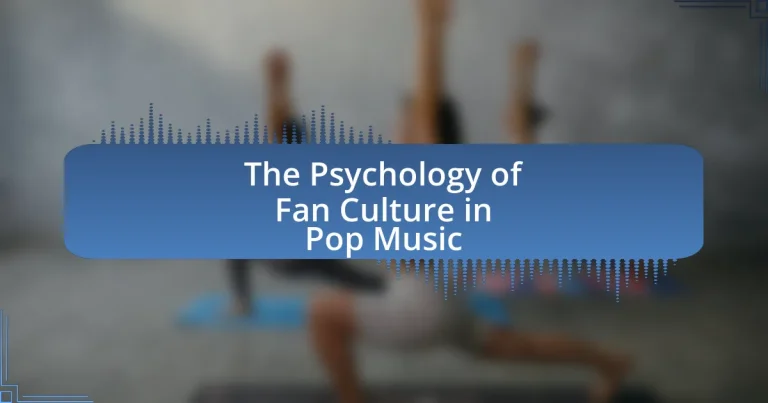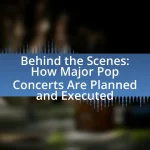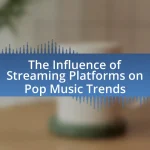The article explores the psychology of fan culture in pop music, focusing on the emotional and social connections fans develop with artists and their music. It examines how fan culture manifests through community engagement, identity formation, and emotional expression, highlighting the activities fans participate in to show their devotion. The article also discusses the psychological needs fulfilled by fandom, the influence of fan culture on the music industry, and the social dynamics within fan communities. Additionally, it addresses the positive and negative psychological effects of fandom, offering strategies for maintaining a healthy relationship with pop music while balancing other life responsibilities.
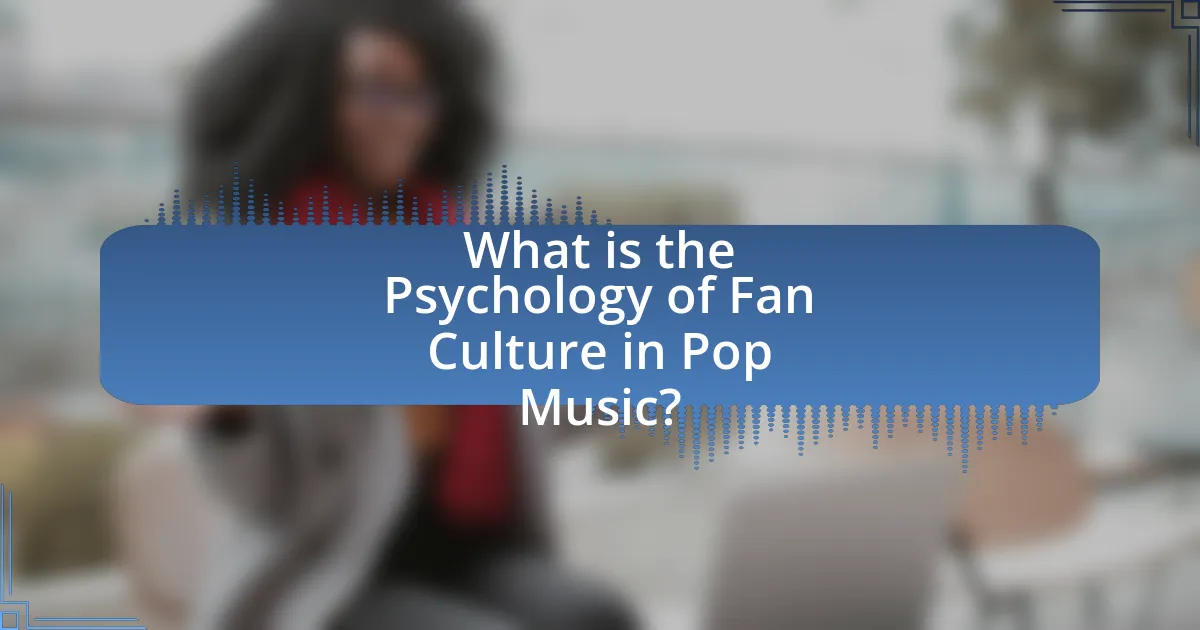
What is the Psychology of Fan Culture in Pop Music?
The psychology of fan culture in pop music revolves around the emotional and social connections that fans develop with artists and their music. This phenomenon is driven by factors such as identity formation, belongingness, and emotional expression. Fans often identify with the values and lifestyles portrayed by pop artists, which can enhance their self-esteem and provide a sense of community. Research indicates that fans experience heightened emotional responses to music, which can lead to strong attachments to artists and their work. For instance, a study published in the Journal of Personality and Social Psychology found that music can serve as a significant source of social identity, influencing how individuals perceive themselves and their relationships with others.
How does fan culture manifest in the realm of pop music?
Fan culture in pop music manifests through active engagement, community building, and the creation of shared identities among fans. Fans participate in various activities such as attending concerts, engaging on social media platforms, and creating fan art or fan fiction, which fosters a sense of belonging and connection to both the music and other fans. Research indicates that these interactions can enhance emotional well-being and provide social support, as seen in studies like “The Role of Music in the Lives of Young People” by North and Hargreaves, which highlights how music fandom can create strong social networks. Additionally, fan culture often influences artists’ careers, as seen with the rise of social media platforms where fan interactions can directly impact an artist’s popularity and marketability.
What are the key characteristics of pop music fandom?
Pop music fandom is characterized by strong emotional attachment, community engagement, and active participation in fan culture. Fans often express their devotion through social media interactions, attending concerts, and purchasing merchandise, which fosters a sense of belonging. Research indicates that pop music fans frequently form social connections with others who share similar musical tastes, enhancing their overall experience and identity. Additionally, the phenomenon of parasocial relationships, where fans feel a personal connection to artists despite one-sided interactions, is prevalent in pop music fandom, further solidifying their loyalty and emotional investment.
How do fans express their devotion to pop artists?
Fans express their devotion to pop artists through various means, including attending concerts, purchasing merchandise, and engaging on social media platforms. Concert attendance allows fans to experience live performances, creating a sense of community and shared enthusiasm. Merchandise purchases, such as clothing and albums, serve as tangible symbols of support and loyalty. Additionally, fans actively participate in online discussions, fan clubs, and social media interactions, where they share content, express admiration, and connect with other fans. This multifaceted engagement reflects the emotional investment fans have in their favorite artists, reinforcing their identity within the fan culture.
Why is understanding fan psychology important in pop music?
Understanding fan psychology is crucial in pop music because it directly influences artists’ marketing strategies, fan engagement, and overall success. By comprehending the emotional and psychological motivations behind fan behavior, artists and record labels can tailor their content and interactions to resonate more deeply with their audience. For instance, research indicates that fans often develop strong emotional connections to artists, which can lead to increased loyalty and spending on merchandise and concert tickets. This connection is supported by studies showing that fans who feel a personal bond with an artist are more likely to participate in fan communities and promote the artist’s work, thereby amplifying their reach and impact in the music industry.
What psychological needs do fans fulfill through their fandom?
Fans fulfill several psychological needs through their fandom, including a sense of belonging, identity formation, and emotional release. The need for belonging is met as fans connect with like-minded individuals who share their passion for a particular artist or genre, fostering community and social interaction. Identity formation occurs as fans adopt aspects of the music and its culture, integrating these elements into their self-concept. Emotional release is achieved through engagement with music, allowing fans to express feelings and cope with stress. Research by the University of California found that music fandom can significantly enhance social connections and emotional well-being, supporting the idea that these psychological needs are effectively fulfilled through fandom.
How does fan culture influence the music industry?
Fan culture significantly influences the music industry by shaping artist branding, marketing strategies, and revenue streams. Fans actively engage with artists through social media, creating a direct line of communication that allows artists to tailor their music and image to meet fan expectations. For instance, platforms like Twitter and Instagram enable fans to express their preferences, which can lead to artists adjusting their musical styles or promotional tactics based on fan feedback. Additionally, fan-driven movements, such as crowdfunding campaigns for albums or tours, demonstrate how fan support can directly impact financial success in the industry. According to a 2021 study by the University of Southern California, 70% of music industry professionals reported that fan engagement directly affects an artist’s marketability and success.
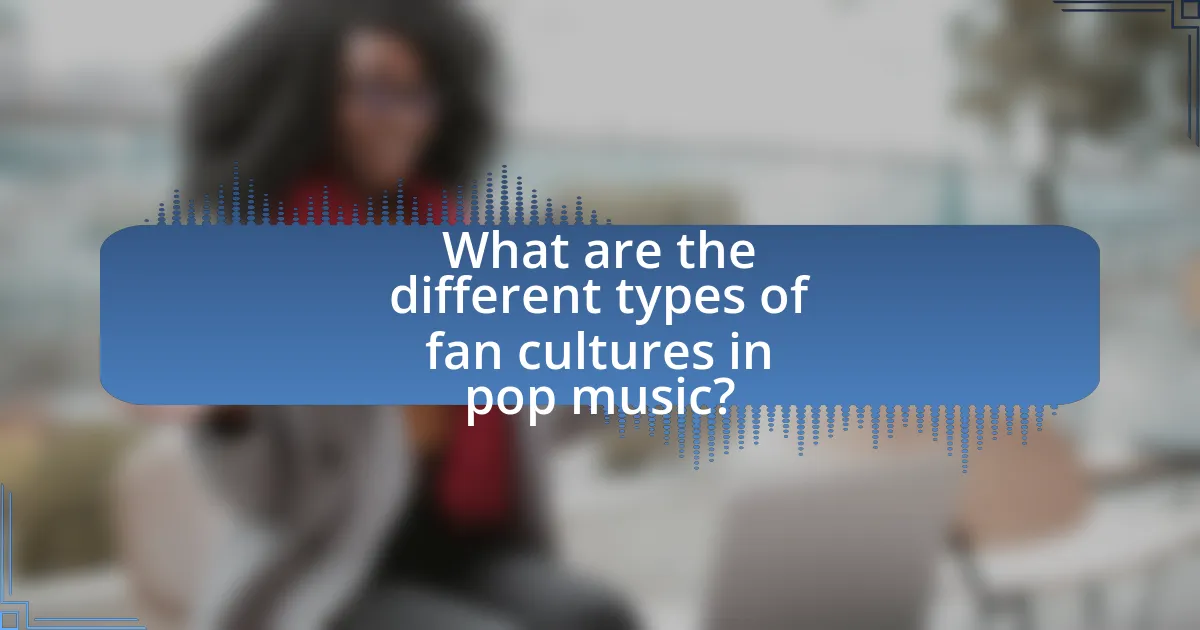
What are the different types of fan cultures in pop music?
Different types of fan cultures in pop music include fandoms based on artist loyalty, genre affiliation, and community engagement. Artist loyalty fandoms revolve around dedicated support for specific musicians, often leading to organized fan clubs and social media groups that promote the artist’s work. Genre affiliation fandoms unite fans who share a common interest in specific music styles, such as pop, rock, or hip-hop, fostering a sense of identity and belonging among members. Community engagement fandoms focus on collective activities, such as attending concerts, participating in fan conventions, or creating fan art, which enhances social connections and shared experiences among fans. These distinctions illustrate the diverse ways in which fans interact with pop music and each other, reflecting their emotional investment and social dynamics within the culture.
How do subcultures within pop music fandom differ?
Subcultures within pop music fandom differ primarily in their values, aesthetics, and community engagement. For instance, fandoms like K-pop enthusiasts often emphasize visual presentation and performance, leading to a culture of elaborate fan art and choreography, while indie pop fans may prioritize authenticity and lyrical depth, fostering a more intimate connection with artists. Additionally, the engagement styles vary; some subcultures, such as those surrounding boy bands, often exhibit highly organized fan activities, including coordinated social media campaigns, whereas others, like alternative pop fans, may focus on grassroots movements and local events. These differences are supported by studies indicating that fan identity is shaped by the genre’s cultural context and the social dynamics within each subculture.
What role do social media platforms play in shaping these subcultures?
Social media platforms play a crucial role in shaping subcultures by facilitating communication, community building, and content sharing among fans. These platforms enable fans to connect with like-minded individuals, share their experiences, and express their identities related to pop music. For instance, research indicates that platforms like Twitter and Instagram allow fans to engage directly with artists, fostering a sense of belonging and participation in the music culture. Additionally, the viral nature of content on these platforms can amplify niche subcultures, as seen with the rise of specific fandoms that gain visibility through trending hashtags and challenges. This interconnectedness not only strengthens existing subcultures but also contributes to the emergence of new ones, demonstrating the significant impact of social media on fan culture in pop music.
How do fan communities form around specific pop artists?
Fan communities form around specific pop artists through shared emotional connections, social interactions, and collective identity. These communities often emerge when fans resonate with an artist’s music, lyrics, or persona, leading to a sense of belonging. For example, the rise of social media platforms has facilitated the formation of fan groups where individuals can express their admiration, share content, and engage in discussions about the artist. Research indicates that fans often seek validation and connection with others who share similar interests, reinforcing their loyalty to the artist. Additionally, events such as concerts and fan meet-ups further solidify these communities by providing opportunities for in-person interactions, enhancing the collective experience.
What are the emotional connections fans develop with pop music?
Fans develop deep emotional connections with pop music through identification, nostalgia, and community. Identification occurs when fans relate personal experiences to the themes and lyrics of songs, fostering a sense of belonging and understanding. Nostalgia is often triggered by pop music, as specific songs can evoke memories tied to significant life events, enhancing emotional resonance. Additionally, community is built around shared musical interests, where fans connect with others, creating a supportive environment that amplifies their emotional experiences. Research indicates that music can activate brain regions associated with reward and emotion, reinforcing these connections.
How does music evoke emotional responses in fans?
Music evokes emotional responses in fans primarily through its ability to trigger memories, influence mood, and create a sense of connection. The auditory elements of music, such as melody, harmony, and rhythm, can elicit specific feelings; for example, major keys often evoke happiness while minor keys can induce sadness. Research indicates that music activates brain regions associated with emotion, such as the amygdala and the prefrontal cortex, which are involved in processing feelings and memories. A study published in the journal “Nature Neuroscience” by Blood and Zatorre (2001) found that pleasurable music can release dopamine, a neurotransmitter linked to pleasure and reward, further reinforcing the emotional impact of music on listeners.
What impact do these emotional connections have on fans’ identities?
Emotional connections significantly shape fans’ identities by fostering a sense of belonging and community. These connections allow fans to identify with the values, emotions, and narratives associated with their favorite artists or music genres, which can enhance their self-concept and social identity. Research indicates that fans often derive a part of their self-esteem from their affiliation with a particular music culture, as seen in studies like “The Role of Music in Identity Formation” by North and Hargreaves, which highlights how music preferences can reflect and influence personal identity. Thus, emotional ties to music not only influence individual identity but also create shared experiences that strengthen group cohesion among fans.
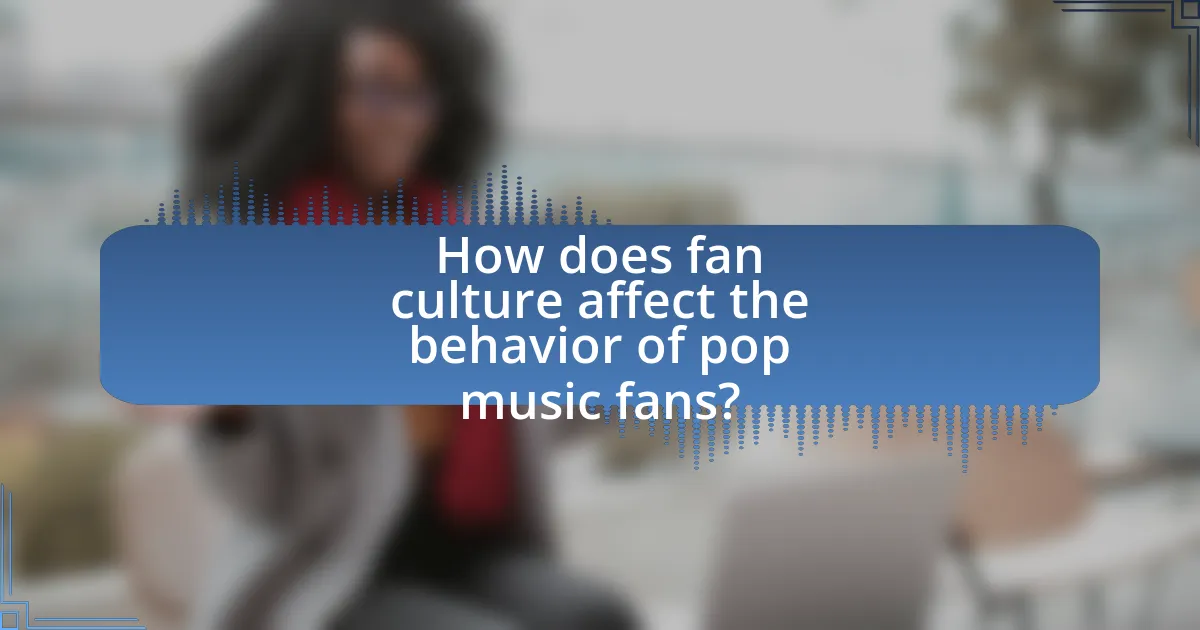
How does fan culture affect the behavior of pop music fans?
Fan culture significantly influences the behavior of pop music fans by fostering a sense of community and identity among them. This communal aspect leads to increased engagement in activities such as attending concerts, participating in online discussions, and sharing content related to their favorite artists. Research indicates that fans often develop strong emotional connections to both the music and the artist, which can enhance their loyalty and influence their purchasing decisions, such as buying merchandise or concert tickets. For instance, a study published in the Journal of Consumer Research found that fans who feel a strong connection to an artist are more likely to engage in word-of-mouth promotion and exhibit brand loyalty, demonstrating how fan culture shapes consumer behavior in the pop music industry.
What are the social dynamics within pop music fan communities?
Social dynamics within pop music fan communities are characterized by strong in-group identification, social bonding, and shared cultural experiences. Fans often form tight-knit groups that foster a sense of belonging and identity, which is reinforced through shared interests in artists, music, and events. Research indicates that these communities facilitate social interaction and emotional support, with fans engaging in activities such as attending concerts, participating in online forums, and creating fan art. A study by the University of Southern California found that 70% of fans reported feeling a sense of community and connection with others who share their musical preferences, highlighting the importance of social dynamics in enhancing fan experiences and loyalty.
How do fans interact with each other during live events?
Fans interact with each other during live events primarily through verbal communication, physical gestures, and shared experiences. During concerts, fans often engage in conversations about the music, artists, and their personal connections to the performance, fostering a sense of community. They also express enthusiasm through cheering, singing along, and dancing, which enhances the collective experience. Research indicates that such interactions can strengthen social bonds among fans, as they share a common passion and emotional investment in the event. For example, a study published in the Journal of Social Psychology found that shared emotional experiences during live music events significantly increase feelings of belonging and connection among attendees.
What role does fandom play in shaping social relationships?
Fandom plays a significant role in shaping social relationships by creating a sense of community among individuals who share similar interests in pop music. This shared passion fosters connections, as fans often engage in discussions, attend events, and participate in online forums together, leading to the formation of friendships and social networks. Research indicates that fans derive social identity from their fandom, which enhances their sense of belonging and can lead to increased social support. For example, a study published in the Journal of Social and Personal Relationships found that fans who actively participate in fandom communities report higher levels of social connectedness and emotional well-being. Thus, fandom not only influences individual relationships but also contributes to the broader social fabric by connecting diverse groups through shared musical interests.
How do fans engage with pop music beyond listening?
Fans engage with pop music beyond listening by participating in live events, creating and sharing content, and forming communities. Attending concerts and festivals allows fans to experience music in a communal setting, enhancing emotional connections with artists and fellow fans. Additionally, fans often create fan art, cover songs, and social media content, which fosters a sense of belonging and creativity. Research indicates that these activities can strengthen fan identity and community ties, as seen in studies highlighting the role of social media in fan interactions and the sharing of music-related experiences.
What activities do fans participate in to show their support?
Fans participate in various activities to show their support, including attending concerts, purchasing merchandise, and engaging on social media platforms. Attending concerts allows fans to experience live performances and connect with artists, while purchasing merchandise, such as clothing and albums, provides financial support to their favorite musicians. Engaging on social media platforms enables fans to share their enthusiasm, interact with other fans, and promote their favorite artists, creating a sense of community. These activities are essential in reinforcing fan loyalty and contributing to the overall success of pop music artists.
How do fans contribute to the promotion of their favorite artists?
Fans contribute to the promotion of their favorite artists primarily through social media engagement and word-of-mouth marketing. By sharing content, such as music videos, concert announcements, and personal experiences, fans amplify the visibility of artists to broader audiences. For instance, a study by the University of Southern California found that social media interactions can significantly increase an artist’s reach, with platforms like Twitter and Instagram serving as key channels for fan-driven promotion. Additionally, fans often organize grassroots campaigns, such as streaming parties or fan meet-ups, which further enhance an artist’s presence in the music industry. These collective actions not only foster community but also create a supportive environment that can lead to increased sales and streaming numbers, ultimately benefiting the artist’s career.
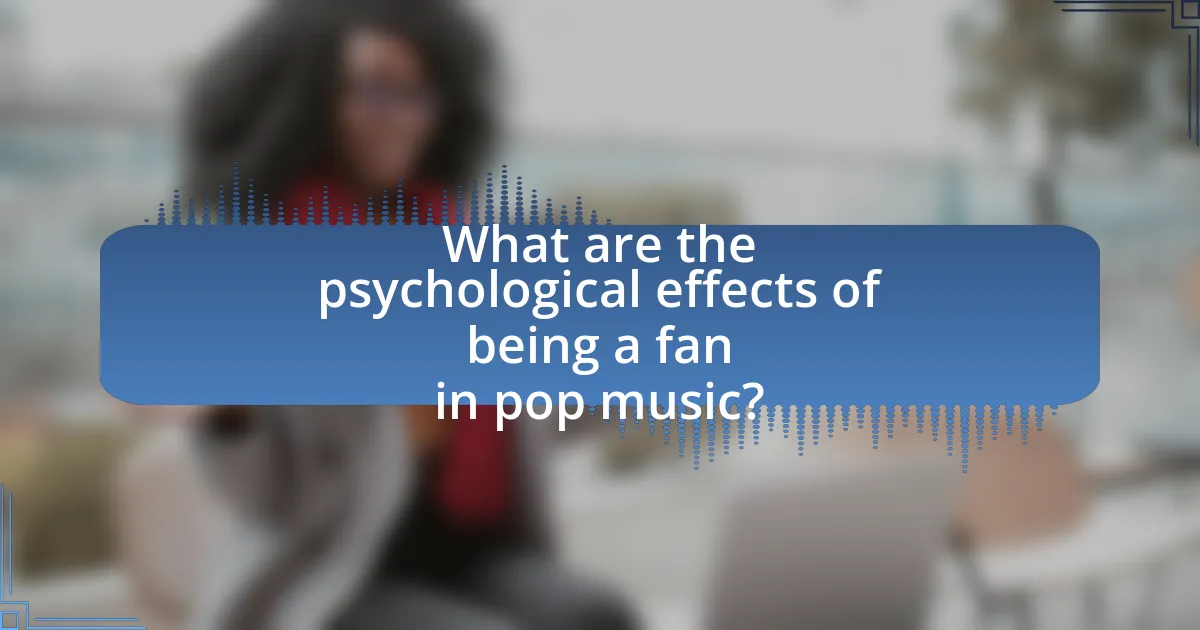
What are the psychological effects of being a fan in pop music?
Being a fan in pop music can lead to various psychological effects, including enhanced emotional well-being, social connection, and identity formation. Fans often experience joy and excitement from their favorite artists, which can elevate mood and provide a sense of belonging within a community. Research indicates that fandom can foster social bonds, as fans engage with others who share similar interests, creating supportive networks that contribute to overall mental health. Additionally, identification with pop music figures can help individuals shape their self-concept and express their values, leading to a stronger sense of identity. Studies have shown that these connections can mitigate feelings of loneliness and depression, highlighting the positive psychological impact of being a fan in pop music.
How does fandom impact mental health and well-being?
Fandom positively impacts mental health and well-being by providing social support, a sense of belonging, and emotional fulfillment. Engaging in fan communities allows individuals to connect with others who share similar interests, which can reduce feelings of loneliness and isolation. Research indicates that participation in fandom can enhance self-esteem and provide coping mechanisms during stressful times. For instance, a study published in the Journal of Applied Social Psychology found that fans who actively engage in fan activities report higher levels of life satisfaction and lower levels of depression compared to non-fans. This evidence underscores the beneficial role that fandom plays in promoting mental health and overall well-being.
What positive effects can fandom have on individuals?
Fandom can have several positive effects on individuals, including enhanced social connections, increased self-esteem, and improved mental well-being. Engaging in fandom allows individuals to form communities with shared interests, fostering friendships and support networks. Research indicates that participation in fan communities can lead to a sense of belonging, which is crucial for emotional health. Additionally, fans often experience a boost in self-esteem through their identification with their favorite artists or shows, as they find inspiration and motivation in their work. Studies have shown that fandom can also serve as a coping mechanism, providing an escape from daily stressors and contributing to overall happiness.
What potential negative consequences can arise from intense fandom?
Intense fandom can lead to negative consequences such as obsessive behavior, social isolation, and aggressive interactions with others. Obsessive behavior may manifest in fans prioritizing their fandom over personal relationships, leading to neglect of family and friends. Social isolation often occurs when fans become so engrossed in their interests that they withdraw from real-life social interactions, which can negatively impact mental health. Additionally, aggressive interactions can arise when fans feel threatened by differing opinions or criticisms of their favorite artists, sometimes resulting in online harassment or real-world confrontations. These consequences highlight the potential for intense fandom to disrupt personal well-being and social dynamics.
What strategies can fans use to maintain a healthy relationship with their fandom?
Fans can maintain a healthy relationship with their fandom by setting boundaries around their engagement and prioritizing self-care. Establishing limits on time spent consuming content, participating in discussions, or attending events helps prevent burnout and obsessive behavior. Research indicates that excessive fandom involvement can lead to negative mental health outcomes, such as anxiety and depression, highlighting the importance of moderation. Additionally, fans should engage in diverse activities outside their fandom, fostering a balanced lifestyle that includes social interactions and personal interests. This approach not only enhances overall well-being but also enriches the fan experience by providing varied perspectives and reducing dependency on the fandom for emotional fulfillment.
How can fans balance their passion for pop music with other life responsibilities?
Fans can balance their passion for pop music with other life responsibilities by setting specific time limits for music-related activities and prioritizing their daily tasks. For instance, allocating certain hours for listening to music or attending events ensures that fans remain engaged without neglecting work, studies, or family obligations. Research indicates that time management strategies, such as the Pomodoro Technique, can enhance productivity and allow individuals to enjoy their interests while fulfilling responsibilities. By creating a structured schedule, fans can enjoy their love for pop music without compromising their other commitments.
What tips can help fans engage positively within their communities?
Fans can engage positively within their communities by actively participating in discussions, supporting fellow fans, and promoting inclusivity. Engaging in discussions allows fans to share their thoughts and experiences, fostering a sense of belonging. Supporting fellow fans, whether through encouragement or collaboration, strengthens community ties and enhances collective enjoyment of pop music. Promoting inclusivity ensures that diverse voices are heard and respected, creating a welcoming environment for all. Research indicates that positive engagement in fan communities can lead to increased satisfaction and loyalty, as seen in studies on social identity theory, which highlight the benefits of group cohesion and support.
